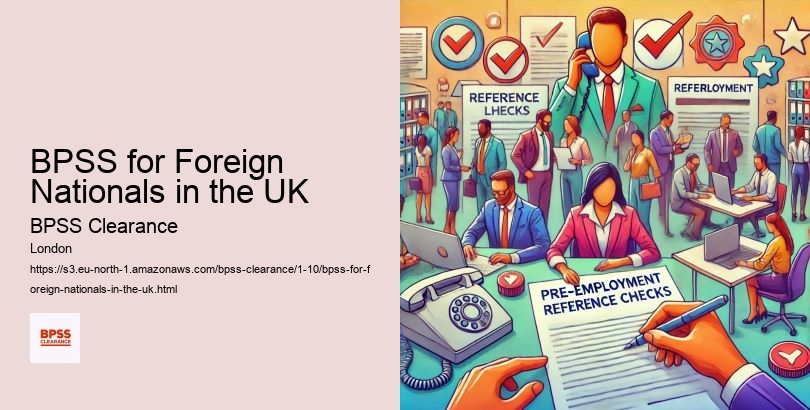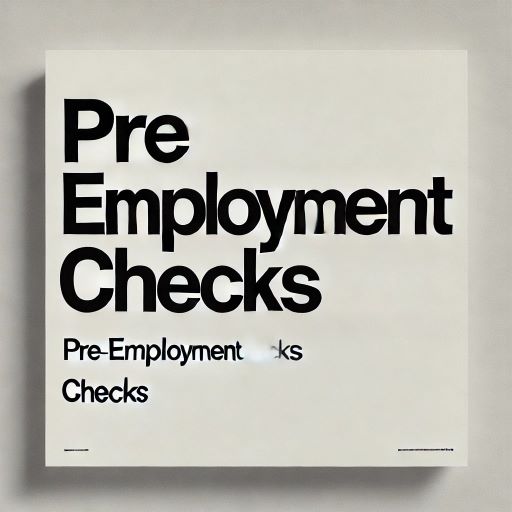

To get an accurate cost estimate, it's advisable to request a quote from a trustworthy screening provider. By screening candidates before employment, organizations mitigate risks associated with unauthorized access to sensitive information, corruption, and potential threats to public safety. Both types of checks are crucial, yet they serve different and complementary purposes within the spectrum of employment background screenings in the UK.
These components collectively contribute to a thorough assessment of an individual's background, aiding organizations in making informed decisions regarding their suitability for roles requiring access to sensitive information. Cloud technology plays a pivotal role in the BPSS process by providing a centralized platform for storing and accessing data across different locations and devices securely. Can You Fail a Bpss?
Transparency in the BPSS clearance process is crucial for maintaining the trust of potential employees. Training for HR personnel on the specifics of BPSS clearance is essential to ensure that all aspects of the vetting process are conducted correctly.
Employment History Validation A minimum of three years of employment history must be provided to complete the recruitment process. BPSS clearance procedures are based on standards set by the UK Government, particularly by the Cabinet Office, which outlines the national security vetting policies.
Ensuring they handle sensitive information responsibly mandates thorough background checking through BPSS. How Much Does a BPSS Check Cost?
Discover what BPSS clearance is and why it's essential in the UK.

Posted by Jasmine Roberts on 2023-07-23
Expert tips on passing BPSS clearance without delays.

Posted by Jasmine Roberts on 2023-05-27
Compare BPSS and SC security clearances in the UK.

Posted by Jasmine Roberts on 2023-05-27
Understand the legal foundation of BPSS checks.

Posted by Jasmine Roberts on 2023-02-02
As technology evolves, it will continue to shape how Baseline Personnel Security Standard checks are conducted, promising even greater improvements in efficiency and security in the future. Regarding regulatory compliance, both standards must adhere to the UK's data protection laws, including GDPR. Employers might probe deeper into any gaps in employment history surpassing 31 days as part of the BPSS process.
Depending on the severity and nature of the crime, certain offenses may disqualify individuals from obtaining BPSS clearance. Under the Immigration, Asylum, and Nationality Act 2006, employers are required to perform right to work checks to confirm an individual's eligibility to work in the UK.
Roles in sectors such as energy, communications, and finance necessitate BPSS clearance to guarantee the protection of sensitive information. Fraud prevention Navigating the BPSS process can pose challenges, particularly when verifying identity and employment history manually.
Failure to verify this can lead to severe penalties, fines, and reputational damage for the organization if they are found to be employing someone illegally. Who Needs a BPSS Check, Confirming the need for a BPSS check involves identifying specific roles and sectors where clearance is mandatory to safeguard sensitive information and establish trustworthiness.

This facilitates seamless collaboration among HR, security departments, and external vetting agencies, making the process more efficient and less susceptible to delays caused by geographic and temporal barriers. This legal requirement helps employers avoid penalties and fines associated with employing illegal workers. This leads to a more reliable vetting process and increases the security and trustworthiness of personnel.
Baseline Personnel Security Standard (BPSS) checks are a fundamental pre-employment screening process in the United Kingdom, primarily designed for individuals who will be working in the government or with government contractors.

Some employers may cover these expenses for their staff. Digital solutions allow for the rapid processing of checks and secure storage of sensitive data, enhancing the overall security and efficiency of the vetting process. Maintain your BPSS clearance by understanding the validity period and renewal requirements.
One of the foremost rules is compliance with the Data Protection Act 2018, which governs the processing of personal data. In conclusion, digital technology has profoundly impacted the BPSS process by making it faster, more accurate, and more secure.
Yes, you can fail a BPSS check if there are discrepancies in your identity verification, right to work status, criminal records, or employment history. Ensuring the right to work involves validating an individual's legal status to be employed in the country.
When undertaking BPSS clearance, organizations must verify four main components: identity confirmation, employment history, criminal record, and right to work status. Organizations that require a Baseline Personnel Security Standard (BPSS) check generally include those involved with national security, government contracts, or any sector where security is paramount.


Another key distinction is in ongoing monitoring and renewal requirements. Additionally, be prepared to submit detailed employment history records like payslips and tax documents to validate at least three years of work experience. This is generally quicker than more detailed checks, such as those performed for higher levels of security clearance, but can still be delayed if there are issues with the national criminal records database or if the individual has spent significant time overseas.
Key components of BPSS clearance encompass verifying the right to work, conducting identity checks, checking criminal records, and confirming employment history. BPSS checks are designed to serve as a preliminary screening for individuals seeking to work in sensitive or secure environments, particularly within the government or its contractors.
For roles where exposure to SECRET and TOP SECRET information is possible, BPSS clearance becomes even more significant in safeguarding classified data. Ensuring transparency in disclosing your overseas experiences is crucial for upholding the effectiveness and integrity of the BPSS clearance process.- Accurate disclosure of all locations visited during these periods is necessary.- Providing reasons for extended stays abroad can help clarify your activities during that time.- Any connections or affiliations established overseas should be clearly communicated.- Highlight any security-sensitive activities or exposures encountered while abroad.
A key component of the BPSS check is the verification of documents, which can be time-consuming. BPSS clearance is usually valid for 3 years from the date of issue.2.
To successfully verify your national and immigration status, you must provide specific documentation. Employers should manage expectations and provide candidates with as much information as possible about what to expect during the BPSS clearance process to ensure a smooth and efficient vetting experience. Coordinating with overseas authorities for document verification and background checks adds another layer of difficulty, extending the time required for completion.
The incorporation of digital technologies in BPSS has allowed for the integration of biometric verification processes such as fingerprinting and facial recognition. Employment history checks are another key component of BPSS clearance, providing insight into an individual's work behavior and integrity.
The BPSS clearance process also assesses the nationality and immigration status of the applicant, confirming their eligibility to work in the UK. This check is in accordance with the Immigration, Asylum, and Nationality Act 2006, which places a duty on employers to prevent illegal working.
This involves verifying previous employment details, gaps in employment, and reasons for leaving previous positions. Failure to renew your BPSS clearance on time can lead to a lapse in access to sensitive information and government assets.1.

Employers conducting BPSS screening must comply with UK data protection laws. Personal data is stored securely and used only for vetting purposes.
Government roles require BPSS Clearance to ensure that employees handling sensitive information are trustworthy, legally authorized to work, and free of disqualifying criminal histories.
Employers rely on BPSS Clearance results to make informed hiring decisions for sensitive roles. It helps ensure candidates meet security standards required for the job.
Delays in BPSS Clearance can occur due to incomplete applications, missing documents, or extended reference checks. Applicants should ensure all information is accurate and complete.
The cost of BPSS Clearance is typically covered by the employer. However, in some cases, applicants may need to pay for certain document-related fees, such as background check certificates.
Yes, international applicants can apply for BPSS Clearance if they meet the eligibility criteria, including having legal authorization to work in the UK and providing required documentation.